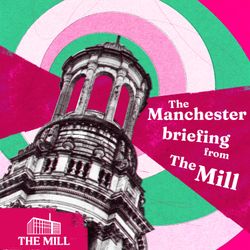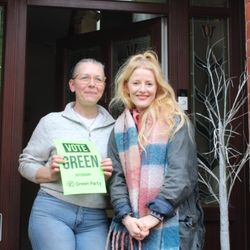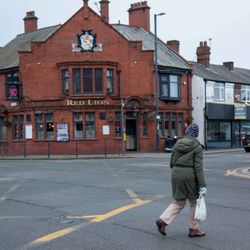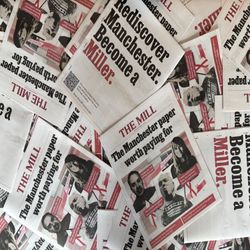Share

The Manchester Briefing from The Mill
A podcast that helps you to understand Greater Manchester better
Latest episode

Byelection special: Hannah Spencer talks millionaire marriage, Patricia Clegg, and Greens in the north
28:23|In today's episode Ophira speaks to Hannah Spencer - Green candidate in the Gorton and Denton byelection - about dirty campaign tactics, whether or not she makes a living as an 'aristocratic heat pump installer', and get her response after Refrom's Matt Goodwin challenges her to a one on one debate.
More episodes
View all episodes

Right-wing media types, Labour infighting and one plumber: we take a long walk through Gorton and Denton
24:51|In this episode of the Manchester Briefing, Jack Dulhanty and Jack Walton discuss our latest ding-dong with the MEN over it paywalling publicly funded journalism; the exodus of staff at HOME; and Jack Walton's recent piece on the Gorton and Denton by-election. Then they take a look at the other runners and riders vying for the seat, and discuss what they're hearing from campaigners on the ground.
Our reporting leads to resignations at the University of Greater Manchester and Rochdale Council
26:01|In our first podcast episode of 2026 Joshi and Jack round up the first week back at Mill HQ. They discuss the two major resignations caused by our reporting into the University of Greater Manchester, Manchester City Council and Rochdale Council, and round up Ophira's reporting on a mysterious spate of graffiti targeting Manchester businesses. Thanks to our sponsor, Manchester Museum. If you want to find out more about the Africa Hub's work at the museum, click below:https://www.museum.manchester.ac.uk/galleries/africa-hub
How The Mill will make Manchester a better place - with your help
16:51|In today’s episode, Joshi and Jack sit down to talk about The Mill’s first ever membership campaign. Over the next few weeks, we want 1,000 new members to join The Mill, so we can commit to six pledges to make Manchester a better place. With that new support, we’ll go into schools to talk about misinformation, make subscriptions free for first time voters and open a mentorship program for aspiring young journalists in Greater Manchester. This is about The Mill’s becoming more than just a newspaper, and how you can be a part of it.
Terror comes to Manchester again: Horror and hope after the synagogue attack
22:23|When news broke about an attack on Jewish worshippers outside Heaton Park synagogue, The Mill's staff writers Jack Dulhanty and Ophira Gottleb were sent to the scene to report. In Ophira's case, she spent the best part of three days straight in the area, interviewing people and vising a community in shock and at prayer. She and Jack discuss what it was like to cover the atrocity, and why Ophira chose to write a much more personal - and hopeful piece - a few days later. If you enjoyed this episode, please share it with friends to spread the word, or become one of our members with a discount by clicking here. Note: this podcast was recorded on Tuesday 7 October and only published on Sunday 12 October because of an issue we had uploading.
Inside the fight to get into Trafford’s grammar schools
13:09|Backstabbing parents, extortionate private tutoring companies and a 'web of deceit'. This is the world of Trafford Grammar Schools, a highly selective group of schools where each year, desperate families put their children through extensive private tutoring to pass the rigorous 11+ exam. Are they living up to their original promise of delivering exceptional education to working-class children? And is there a sense of cruelty in how the system works? Ophira Gottlieb, staff writer at The Mill, takes you inside her reporting.Read Ophira's first story: Backstabbing, crying, and a ‘web of deceit’: Inside the fight to get into Trafford’s grammar schoolsRead her second story: Grexit: should Trafford keep its grammar schools?To read more of these stories and support our mission to bring about a renaissance in high quality journalism in the North, sign up as a paying member for just £4.95 for your first three months.With thanks to our sponsor, Newton Music Festival. If you fancy a summer weekend of DJs, bands and festival fun, Newton Music Festival is offering just that from Friday 1st to Sunday 3rd August. The lineup includes (former Mill contributor) Dave Haslam on Friday, The K’s on Saturday and Flash (a Queen tribute band) on Sunday, and is set to repeat the incredible success of last year’s festival. Hosted in the beautiful Mesnes Park, just a 20 minute train from Piccadilly, Newton Music Festival has something for everyone. Day tickets start at £15 and Mill readers can get an exclusive 10% discount using the code ‘1qjpad’ – click here to book.
5. Meet the Showmen of Bolton
10:40||Season 2, Ep. 5